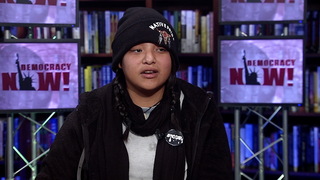
Guests
- Debra White Plumelongtime Lakota water and land rights activist who was born and raised on the Pine Ridge Indian Reservation in South Dakota, and lives along the banks of Wounded Knee Creek. She is executive director of Owe Aku.
While Democracy Now! was covering the standoff at Standing Rock earlier this month, we spoke to longtime Lakota water and land rights activist Debra White Plume, who was born and raised on the Pine Ridge Indian Reservation in South Dakota and lives along the banks of Wounded Knee Creek. She described what the Dakota Access pipeline means to her.
Transcript
AMY GOODMAN: That same day, though, right next to the Red Warrior Camp protesting the pipeline, we spoke to longtime Lakota water and land rights activist Debra White Plume, born and raised on the Pine Ridge Reservation in South Dakota, living along the banks of Wounded Knee Creek. I asked her to talk about what the Dakota Access pipeline means to her.
DEBRA WHITE PLUME: What it means to me is that it pushes us further over the tipping point of not only fossil fuel extraction, but the desecration of Mother Earth and the exploitation of Native peoples in the area, as well as the threat to drinking water. Where I live, six hours from here, when I turn on my tap, the water that comes out is from the Missouri River. It’s a 50-50 mix with the Ogallala Aquifer and the Missouri River, because at home our aquifer is badly contaminated by decades of uranium mining. So, there’s only portions of the aquifer on the Pine Ridge Reservation that pass the Environmental Protection Agency’s maximum contaminant level for alpha emitters. So we have to mix half and half with the Missouri River water.
AMY GOODMAN: And what would happen to the Missouri River water?
DEBRA WHITE PLUME: Well, if the pipeline is put in, it’s going to leak or spill or burst or explode, and that oil is going to get into the water. And Dakota Access pipeline says they’re going to bury it 30 feet under, and they’re assuring everybody that it’s going to be safe. But I think Western science doesn’t really know everything it thinks it knows. And we need to make our decisions based on what’s best for Mother Earth and our coming generations. And that includes protecting our water. Water is under threat all over the world. Right now, there are people who have no access to clean drinking water.
AMY GOODMAN: Do you call yourself a protester?
DEBRA WHITE PLUME: No, I call myself—first and foremost, I’m just a regular human being. I’m a mother and a grandmother, a great-grandmother. I’m Lakota. I’m a woman. And it’s—water is the domain of the women in our nation. And so, it’s our privilege and our obligation to protect water. So, you know, if somebody wants to label me, I guess it would be water protector.
AMY GOODMAN: You go way back to the Pine Ridge Reservation, where you live today, 1973. Could you describe what happened then?
DEBRA WHITE PLUME: Sure. What happened then was the Indian Reorganization Act government, which is an act of Congress, in place in 1934, governs most Native nations in the United States. Well, our IRA government at that time was very oppressive to Lakota people. They were keeping us from having jobs or homes or whatever few services the federal government provided, because we held onto the Lakota way of life, and we also wanted to reclaim not only our identity, but our lands and the care of our land and the responsibility of caring for our land.
And at that time, the tribal president was Dick Wilson, and he had been working with the federal government to sign away one-eighth of our homeland to the federal government. And it just happened to be where there was a lot of what the fat taker calls resources, and they want to mine it—you know, coal, gas, oil, uranium, whatever it may be, water. And so, we put up a ruckus, and we said, “No, you’re not going to do that, because our coming generations need that.”
And so, there were a lot of shootouts and armed struggle going on in those days. And in the so-called border towns around us, which we call occupied territory, Indians were getting killed, and their murderers were not being held for justice. They were like charged with the lowest felony there could be, doing two years of probation. And it was just enough was enough. You know, it was a moment in time there was the women’s movement, there was the civil rights movement, there was the Vietnam War stuff going on. And we just said, “That’s enough for us, too. We’re not going to take this anymore.” And we stood up, and we fought. You know, we had to fight our own government, and they called in the FBI and the Marshals and the Army. Basically, it was a military occupation of our homeland.
AMY GOODMAN: And what happened then?
DEBRA WHITE PLUME: Well, Wounded Knee was liberated by relatives from the Four Directions. And the military came in and surrounded the little tiny village of Wounded Knee. And the rest is history. But we were able to get our spiritual way of life removed as a criminal act in American law. Prior to that, it had been a crime to practice our way of life. We have many people that went to prison in those days or were committed to, held in and died at state mental institutions for having a sacred pipe or conducting any of our ceremonies.
AMY GOODMAN: Lakota leader Debra White Plume of the Pine Ridge Reservation, speaking from Red Warrior. Special thanks to Laura Gottesdiener, John Hamilton, Denis Moynihan.













Media Options